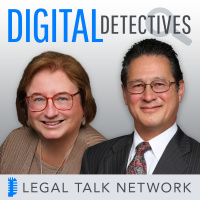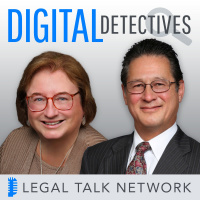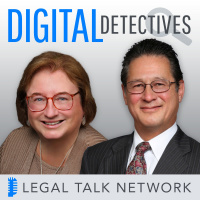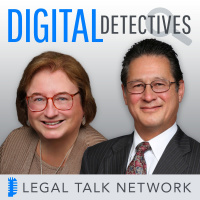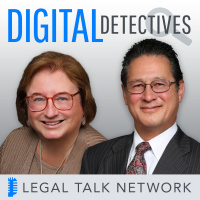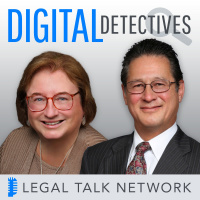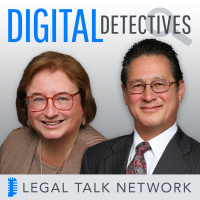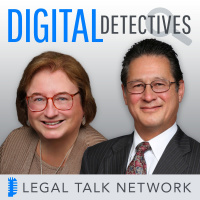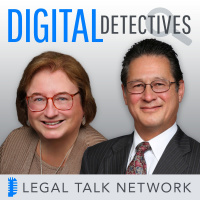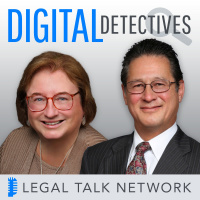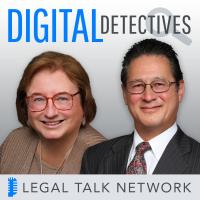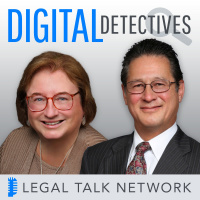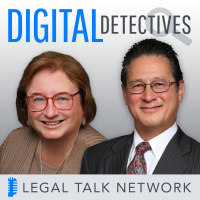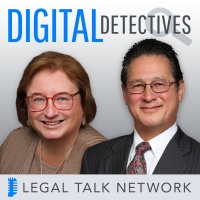Sinopsis
Hosted by two leaders in the cyber-security industry, Sharon D. Nelson, Esq. and John W. Simek, Digital Detectives is for listeners who are interested in digital forensics, e-discovery, and information security issues. Nelson and Simek invite digital forensic and computer security experts to enlighten listeners on the latest technology, cyber threats, and necessary security measures to keep online data secure.
Episodios
-
The Government’s Dark Data: A Decade of Discovery
21/01/2015 Duración: 23minIn this episode of Digital Detectives, Sharon Nelson and John Simek interview Jason Baron about information governance, dark data, open government, and his role in The Decade of Discovery. Baron talks about the increasing amount of electronic data affecting the Freedom of Information Act (FOIA) and the discussion e-discovery experts need to have about providing public access to government records. There is a mandate, he explains, that after 2019, all federal agencies must provide all of their permanent records to the archives in electronic or digital form. Because of this, systems and sophisticated softwares will be required to properly filter and provide access to the data. Baron also discusses information governance as a whole, including privacy, security, discovery, and management, and the need for a Chief Information Governance Officer (CIGO) going into the future. He concludes by praising Richard Braman, a leader in the e-discovery industry, for founding the Sedona Conference and creating the Cooperation
-
The Sony Hack: You Can’t Keep the Barbarians Outside the Gate
16/01/2015 Duración: 29minIn November of 2014, hackers infiltrated Sony's computer network lifting terabytes of corporate data, human resources information, internal intel, films, corporate emails, and other valuable information. This led the corporate world to question how protected we really are from cyber attacks. In the 1990's, the only computer issue was viruses, but the attack vectors have since changed. Companies and individuals are now subject to spear phishing, spyware attacks, malware, drive-by downloads, and browsers. What steps are now necessary to keep hackers from accessing your valuable data? And on a separate but equally interesting subject for lawyers, who really was behind the Sony attack? In this episode of Digital Detectives, hosts Sharon Nelson and John Simek analyze the progression of data security over time, look into data loss prevention steps, and consider each potential suspect of the Sony hack. Nelson describes the internet security suites that have been developed to include protection from all different ty
-
Issues and Trends in E-Discovery and Information Governance
16/12/2014 Duración: 26minAs lawyers, we hear a lot about the technological advances in e-discovery and information governance. How do you describe the current state of e-discovery from an opportunity and growth perspective, and how does this market opportunity impact the pulse rate of mergers, acquisitions, and investments? For lawyers purchasing e-discovery packages, there are several types of vendors and pricing models, and they need to be asking the right questions. What does the data governance solution need to do, how much does it cost, what are the time constraints, and how complex is the system? In this episode of Digital Detectives, Sharon Nelson and John Simek interview technology marketer Rob Robinson about the current and future trends in data governance, how to choose an e-discovery provider, and events that will influence e-discovery and information governance in 2015. Robinson explains that the combination of software and services that make up the worldwide market for e-discovery in 2014 is just over 6.2 billion dollar
-
War & Terrorism in Cyberspace: Wild, Wild West Shoot Out on the International Frontiers
13/11/2014 Duración: 29min"A cyber attack on the World Trade Center would be 10 times more financially damaging than the 2001 attack." Data breaches like the ones at Target, JP Morgan, and Home Depot have recently been all over the news and are usually organized by hackers for financial gain. But there is cyber war happening with military and political objectives with potentially far more damaging results. Cyber terrorists and militaries have already developed technologies that are able to hack into important data systems, destroy critical infrastructure, and take down crucial things like power grids and financial systems. If this does not scare you, there are almost no direct laws that deal with the ramifications of cyber attacks, the contractors who built the failing technology, or innocent bystanders. On this episode of Digital Detectives, Sharon Nelson and John Simek interview cybersecurity expert David Bodenheimer about the effects of cyber attacks, whether they are likely to proliferate, the connection between the private secto
-
Predictive Coding for Rookies: E-Discovery in the Courtroom
27/10/2014 Duración: 33minDiscovery, as all lawyers know, is the process of collecting and exchanging information about the court case to prepare for the trial. Traditionally, this was done by many lawyers over countless billable hours in which every page of potential evidence was examined for important information. Because of this, the more information existed in reference to a case, the more expensive the case was. As technology developed, law firms began using computers to do keyword searches and conceptual searches. Unfortunately, there were problems including picking the right keywords or concepts, misspelled words, how to structure the items, and that these searches only yielded 20% of important data. Recently, technology has advanced to predictive coding, or teaching a computer program to think like a lawyer would. But how cost effective and practical is predictive coding, and how well does it actually work? In this episode of The Digital Detectives, Sharon Nelson and John Simek discuss the evolution of technology and case dis
-
Rule 37(e) of the Federal Rules of Civil Procedure: Changes for ESI Preservation and Spoliation
24/09/2014 Duración: 25minIn 2006, the Federal Rules of Civil Procedure rule-makers developed and put into practice amendments dealing with electronically stored information (ESI) and e-discovery. However, most of those involved believed these amendments did not adequately deal with lost or missing ESI or "the spoliation issue." In 2014 the rule-makers proposed Rule 37(e), which deals with the issue of spoliation equally across all federal courts, resolving the issue of inherent authority, or judges making decisions individually for each case. What are these changes and how will they affect the way businesses deal with e-discovery and data preservation? In this episode of The Digital Detectives, Sharon Nelson and John Simek interview ESI preservation expert James Kurz about how Rule 37(e) works and what the consequences are for the future of ESI preservation. Kurz explains that the rule, which only deals with ESI, proposes a three part test before considering spoliation issues: the ESI should have been preserved in the anticipation o
-
Cull, Baby, Cull - Modern Trends in Data Collection and Analysis
18/08/2014 Duración: 29minDespite all the attention that e-discovery has received over the last decade, it is still a relatively new part of the litigation process. For those lawyers who were never exposed to e-discovery in law school or their formative years, the systems and products involving data collection and analysis can be overwhelming and complex. How much do lawyers need to know about information governance, data collection, data analysis, managed document review, and electronically stored information (ESI)? Alternately, for those data collection practitioners who are already intricately involved in the culling and analysis, how is the technology and process changing? In this episode of Digital Detectives, Sharon Nelson and John Simek interview e-discovery solutions expert Aaron Lawlor about what is involved with ESI and data collection, current trends in data analysis, and future advances in technology and process. Lawlor urges every litigator to become experienced with the state and federal rules involving e-discovery in o
-
Data Breaches, eDiscovery, and the Importance of Digital Forensics
28/07/2014 Duración: 21minEvery law firm can run into incidents of employee misconduct, data breaches, and intellectual property theft. In the age of modern technology, data breaches, insider trading, and other security problems require extensive technological forensics. Partners and firm owners, as well as lawyers working within the firm, need to understand why a digital investigation is needed, what steps should be taken within an investigation, and who should be involved. Having this knowledge can save the firm thousands of dollars while uncovering the truth. In this episode of Digital Detectives, Sharon Nelson and John Simek interview ediscovery and compliance attorney Patrick Oot about how attorneys should be prepared on technology issues when they start to investigate criminal and civil matters. Everyone leaves technology footprints, Oot explains. Whether dealing with an internal investigation or with client data, the most important asset is unbiased, comprehensive, and well documented research. When hiring a digital investigat
-
77% of Lawyers Can’t Be Trusted With Confidential Client Data
07/07/2014 Duración: 24minAll lawyers have an ethical obligation to employ security measures when sharing information and data with their clients. Whether that means encrypting all important emails or properly researching cloud based file-sharing services like Dropbox, it is incumbent on lawyers to understand the levels of security available. LexisNexis recently did a survey on what tools lawyers and legal professionals are using to protect their clients' privileged information. 77% of the lawyers surveyed did not have adequate security for their confidential client data. How important is encryption and what can lawyers do to change the way they share data? On this episode of Digital Detectives, Sharon Nelson and John Simek interview Bob Ambrogi, a lawyer and journalist who recently wrote about the LexisNexis survey. They ask him about the implications of the survey, what security measures lawyers should be taking, how frequently clients are hurt by lack of security, and why lawyers are generally resistant to learning about data encr
-
The FBI’s Massive Facial Recognition Database: Privacy Implications
24/05/2014 Duración: 19minOn February 12th of 2008, the FBI announced that it had hired Lockheed Martin to build its Next Generation Identification system (NGI) to deploy multimodal matching to biometric data of US citizens. Today, NGI's database contains several types of unique identifiers including fingerprints, iris prints, and facial recognition. On this episode of Digital Detectives, hosts Sharon Nelson and John Simek interview Jennifer Lynch from the Electronic Frontier Foundation. Together they discuss false identifications, mandatory background checks, and the First Amendment right to be anonymous. Tune in to learn more about EFF's FOIA request and how the FBI is using the data of the innocent to look for guilty parties. Jennifer Lynch is a senior staff attorney with the Electronic Frontier Foundation, a non-profit organization dedicated to defending civil liberties in the digital world. At EFF, Jennifer works on privacy issues in new technologies such as biometrics, domestic drones, and location tracking devices. She success
-
Perils of Law Firms Possessing Massive Amounts of Unreviewed Client Data
11/04/2014 Duración: 23minSome experts believe that, in addition to being prohibitively expensive for law firms to manage, maintaining immense amounts of client data increases the probability that it will be exposed to the public through a security breach or hack. That is why many like-minded firms are outsourcing data management to companies that specialize in it. On this episode of Digital Detectives, hosts Sharon Nelson and John Simek interview Ralph C. Losey from Jackson Lewis P.C. Together, they discuss how to manage large amounts of data, when to outsource, and what to do with unprocessed information. Tune in to learn more about dark data, how to select outside vendors, and hosting costs vs. storage costs. Ralph C. Losey is a shareholder of Jackson Lewis P.C., a law firm specializing in labor and employment law with over 52 offices nationwide and 800 attorneys. Ralph serves as the firm's National e-Discovery Counsel in charge of electronic discovery issues. Ralph has limited his practice to e-discovery since 2006 and is the aut
-
The Ethical Implications of NSA Surveillance for Lawyers
21/03/2014 Duración: 23minSome technology experts believe it's not a matter of if law firm communications can be hacked, but when. With continuing reports of the NSA and foreign entities monitoring the privileged attorney-client communications of US law firms, lawyers may be required to take additional measures to protect client information. On this edition of Digital Detectives, hosts Sharon Nelson and John Simek discuss the growing dangers and evolving duties for clients and attorneys with cyber security expert David Ries from Clark Hill Thorp Reed. Among the many changes to legal practice are alterations to the Model Rules of Professional Conduct, increased contractual expectations from clients, and a growing need to encrypt portable devices. Tune in to learn more about these developing areas of attorney responsibility. David Ries is a member in the Pittsburgh office of Clark Hill Thorp Reed, LLP where he practices in the areas of environmental, commercial, and technology law and litigation. He regularly deals with privacy and sec
-
The Kindergarten Version of Information Security for Lawyers
24/02/2014 Duración: 25minFrom malware and hackers to BYOD and TYOD, the biggest threat to law firm data could be the attorneys themselves. On this episode of Digital Detectives, hosts Sharon D. Nelson and John W. Simek interview data expert Ben M. Schorr and discover complex new threats to data security and the simplest solutions to reduce them. Schorr is a technologist and Chief Executive Officer for Roland Schorr and Tower, a professional consulting firm headquartered in Flagstaff, Arizona with offices in Hawaii and Oregon. He is also the author of several books and articles on technology, including The Lawyer's Guide to Microsoft Outlook, The Lawyer's Guide to Microsoft Word, and Microsoft OneNote in One Hour for Lawyers. He's been a Microsoft MVP for more than 15 years and involved with management and technology for more than 20 years.
-
What Should Lawyers Know About Information Governance?
21/01/2014 Duración: 23minIn this edition of Digital Detectives hosts Sharon D. Nelson and John W. Simek invite Jason R. Baron, former director of litigation at the U.S. National Archives and Records Administration to discuss Information Governance as it relates to e-discovery, privacy, record keeping and security. Baron connects the dots between all these areas and helps lawyers understand they need to know about information governance and the current trends he is see in this area. Baron serves as counsel to the Information Governance and E-Discovery Practice Group at the law firm of Drinker Biddle and Reath, in Washington, DC. His prior career in the federal service included acting as trial lawyer and senior counsel at the Department of Justice, and for the past 13 years as director of litigation at the US National Archives and Records Administration. He is an internationally recognized speaker on the subject of electronic records.
-
Data Breaches in the Healthcare Industry: Lessons for Law Firms
13/12/2013 Duración: 25minThe first thing guest Alan Goldberg highlighted was the colossal cost of data breaches. He explained that the minimum cost is $100,000 and it has the potential to amount to millions. In this edition of Digital Detectives, your hosts Sharon Nelson and John Simek invite Goldberg to discuss the usual reasons for a breach, likely consequences, prevention, and more. Goldberg is a solo practitioner in McLean, Virginia. A past President of the American Health Lawyers Association, he teaches Health Law and Health and Information Technology as an adjunct professor at American University, Washington College of Law, and George Mason University School of Law. Special thanks to our sponsor, Digital WarRoom.
-
A State Judge’s Perspective On E-Discovery
07/11/2013 Duración: 32minThe Honorable John M. Tran uses the terms digital natives and digital immigrants when referring to judges. Coined by author Marc Prensky, digital natives are those born into technology and digital immigrants are learning the field as they go. It’s not uncommon for judges to be digital immigrants, forcing them to confront issues on the bench that they have never experienced. In this edition of Digital Detectives, hosts Sharon D. Nelson, Esq. and John W. Simek invite long-time friend Judge Tran to discuss how his colleagues keep up to date on technology, his views on cooperative discovery as both a judge and a past litigator, and what he’s seen as the best way to address discovery in the courtroom. Judge John M. Tran started his career at a boutique litigation law firm in Virginia where he had extensive experience in e-discovery matters, in both the state and federal court. Now he is a state judge in the Fairfax Circuit Court, in the 19th judicial circuit of Virginia. He is a graduate of the George Washington
-
The Implications of NSA Surveillance for Lawyers
04/10/2013 Duración: 37minEdward Snowden’s leaks about NSA surveillance have been a hot topic in the media for the last few months. But what do lawyers, specifically, need to worry about? The answer is: a lot. On this edition of Digital Detectives, hosts Sharon D. Nelson and John W. Simek take the stage and examine NSA surveillance as it relates to lawyers. Tune in for an overview of Snowden and the NSA surveillance controversy, how effective (or ineffective) encrypting data is, whether the surveillance is having a chilling effect on lawyers, how to abide by the Model Rules of Professionalism 1.6, and an answer to the underlying question - has George Orwell’s dystopia, 1984, arrived a few decades late?
-
Cyber Risk Management for Lawyers
13/09/2013 Duración: 31minLawyers hold some of their clients’ most private communications, which makes them a top target of all hackers. As technology competence becomes the required norm, lawyers need to understand not only how to protect their clients’ information but how to react if a cyber attack does happen. On this episode of Digital Detectives, Sharon D. Nelson, Esq. and John W. Simek invite Steven Chabinsky to discuss cyber-risk management for lawyers. Steven Chabinsky is senior vice president of legal affairs, general counsel, and chief risk officer for the cyber-security-technology firm CrowdStrike. He is also is an adjunct faculty member of George Washington University and the cyber columnist for Security Magazine. Prior to joining CrowdStrike, Chabinsky had a distinguished 17-year career with the FBI, during which he was the top cyber lawyer, then the head of the Cyber Intelligence Section, and ultimately deputy assistant director of the FBI's Cyber Division. Tune in to hear the major threats law firms are facing, what la
-
Hot Developments Among E-Discovery Vendors
06/08/2013 Duración: 27minThis episode of Digital Detectives discusses e-discovery vendor trends. Hosts Sharon D. Nelson, Esq. and John W. Simek welcome entrepreneur and friend Andy Wilson to share his insights on what’s going on in the industry and what’s to come. Andy Wilson is CEO and co-founder of Logik, whose e-discovery platform, Logikcull, was created to make complicated e-discovery projects easy and manageable. He focuses on product design and management and serves as the company’s visionary behind product marketing and strategy. Logik is now offering infinite storage to its customers, and Wilson believes this is the future of storage pricing. Tune in to hear about the impact of the new normal on e-discovery vendors, the consolidation of the marketplace, how vendors need to change to survive, what Wilson predicts will be the next big trend in the field, and more. Thanks to our sponsor, Digital WarRoom.
-
Highlights from the 2013 Georgetown E-Discovery Training
03/07/2013 Duración: 29minOn This edition of Digital Detectives, co-hosts Sharon D. Nelson, Esq. and John W. Simek discuss the Georgetown E-Discovery Training Academy with Tom O’Connor. The training consists of a week-long curriculum for those interested in becoming fluent in e-discovery through small-group discussions and interactive-learning sessions. O’Connor is a senior consultant for Gallivan, Gallivan & O'Melia, creators of the Digital WarRoom e-discovery software. He is co-author of the book E-Discovery for Small Cases: Managing Digital Evidence and ESI. The book was noted by PRWeb as the first book to “mainstream” e-discovery for all cases. He is a frequent author and speaker on legal technology and dedicates his work to making advances in the field. If you couldn’t make it, here’s your chance to learn about the conference: who was there, what they learned, and the plans for next year. Thanks to our sponsor, Digital WarRoom.

